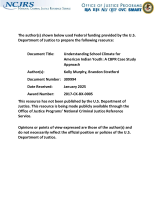Research programs
“I was Able to Like, Kind of Breathe.” Baseline Perspectives and Lessons Learned from Participants of a Co-Response Program
Partnering to Enhance Services for Survivors: An Evaluability Assessment and Formative Evaluation of Safe Horizon's Anti-Trafficking Program
Data Resources of the National Institute of Justice, 13th Edition
Forced Condensation of Cyanoacrylate With Temperature Control of the Evidence Surface To Modify Polymer Formation and Improve Fingerprint Visualization
Understanding Violence Against Women
Report From the States on What Works at the State and Local Levels: A Compendium of Assessment and Evaluation Results
Reduced Recidivism and Increased Employment Opportunity Through Research-Based Reading Instruction
Prediction and Typology Development: Introduction and Progress Report
Bethlehem Police Family Group Conferencing Project
Breaking the Cycle of Intergenerational Childhood Maltreatment: Effects on Offspring Mental Health
Understanding School Climate for American Indian Youth: A CBPR Case Study Approach
30 Years of the Violence Against Women Act: Endurance, Expansion, and the Next Era
Summary of a plenary panel from the 2024 NIJ Research Conference
Advancing Denver’s Handgun Intervention Program through Action Research
Responding to Intimate Partner Violence Related Strangulation Integrating Policy, Practice, and Rese
This webinar examines the problem of Intimate Partner Violence Strangulation and an innovative response policy. The presentation will include an overview of the nature and extent of strangulation, its dangers, and adverse medical consequences followed by a review of a Strangulation Ordinance in Burleson, Texas that mandates extensive training for first responders and a city-wide response protocol for strangulation detection and investigation, documentation of strangulation signs and symptoms, medical assistance, and service referrals for strangulation survivors.
See the YouTube Terms of Service and Google Privacy Policy
SERIOUSNESS OF CRIMES - NORMATIVE STRUCTURE AND INDIVIDUAL DIFFERENCES
Celebrating 10 Years of NIJ’s Law Enforcement Advancing Data and Science (LEADS) Scholars Program - 2024 NIJ Research Conference
In 2014, NIJ established the Law Enforcement Advancing Data and Science (LEADS) Scholars Program to support research-minded, mid-career sworn law enforcement officers working to integrate research into agency policy and practice. The LEADS Scholars Program helps participants develop independent research and provides support to identify current evidence on priority issues.
See the YouTube Terms of Service and Google Privacy Policy
Evaluating Technology-Based Services for Victims of Crime
Understanding the Impact of COVID-19 on Victim Services
The COVID-19 pandemic had a detrimental impact on communities across the nation and significantly affected various aspects of individuals’ lives. One of the negative impacts was an increase in gender-based violence accompanied by shifting barriers to accessing services and support. Victims and victim service providers faced various challenges dealing with the increase in need for services, navigating barriers to help-seeking, and addressing logistical issues.
See the YouTube Terms of Service and Google Privacy Policy




